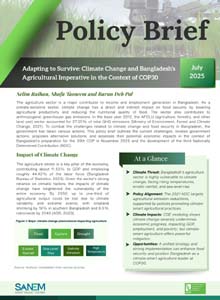Policy Brief on
“Adapting to Survive: Climate Change and Bangladesh’s Agricultural Imperative in the Context of COP30”
 Citation: Raihan, S., Tasneem, S., & Pal, B. D. (2025). Adapting to Survive: Climate Change and Bangladesh’s Agricultural Imperative in the Context of COP30. SANEM-IFPRI Policy Brief. July 2025. SANEM Publications. Dhaka.
Citation: Raihan, S., Tasneem, S., & Pal, B. D. (2025). Adapting to Survive: Climate Change and Bangladesh’s Agricultural Imperative in the Context of COP30. SANEM-IFPRI Policy Brief. July 2025. SANEM Publications. Dhaka.
The agriculture sector is a major contributor to income and employment generation in Bangladesh. As a climate-sensitive sector, climate change has a direct and indirect impact on food security by lowering agricultural productivity and reducing the nutritional quality of food. The sector also contributes to anthropogenic greenhouse gas emissions. In the base year 2012, the AFOLU (agriculture, forestry, and other land use) sector accounted for 27.35% of total GHG emissions. To combat the challenges related to climate change and food security in Bangladesh, the government has taken various actions. This policy brief outlines the current challenges, reviews government actions, proposes alternative solutions, and assesses their potential economic impacts in the context of Bangladesh’s preparation for the 30th COP in November 2025 and the development of the third Nationally Determined Contribution (NDC).
